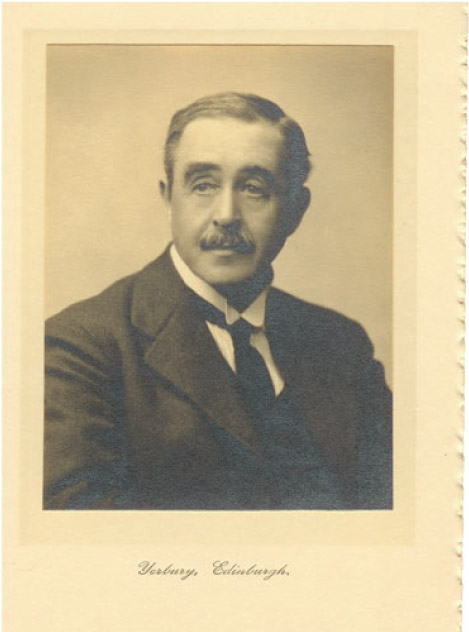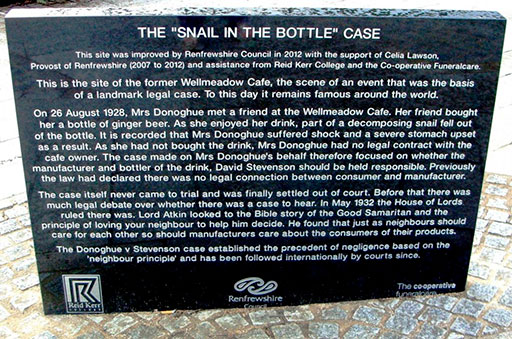1.2 Information often omitted by standard law texts
Walter Leechman was Mrs Donoghue’s solicitor. The presence of foreign bodies in Scottish ginger beer bottles was a surprisingly regular phenomenon in the late 1920s, and Leechman had previously litigated such claims. These previous cases concerned dead mice floating in the bottom of ginger beer bottles. He represented the consumers of the mouse-flavoured ginger beer when they sued the manufacturer in delict. One of the cases was successful at first instance but the other was dismissed.
The dismissed claim was appealed. It became the conjoined appeals in Mullen v AG Barr & Company Limited [1929] SC 461 (Ct Sess) [Barr] 461. The appeal was heard by the Court of Session over the course of three days in early March 1929. The pursuers in Mullen had argued at first instance (when the case was first heard in the lower courts) that negligence could be inferred from the mere presence of the dead mice in the ginger beer bottles. This argument failed decisively on appeal against the decision of the lower court (the original judgment of the lower court was appealed to the Court of Session). A majority in the Court of Session also held that, in the absence of a contractual relationship between the parties, even if the pursuers had been able to prove negligence on the part of the manufacturer, no duty of care would have been owed by the manufacturer to the ultimate consumer except where:
- firstly, the manufacturer knew that the product was dangerous as a result of some defect and that fact was concealed from the purchaser (in which case the manufacturer would be guilty of negligence or, in appropriate cases, even fraud); or,
- secondly, where the manufacturer was the producer of goods which were dangerous per se (the judgments give the example of explosives) and failed to warn the purchaser of this fact.
It is worth noting that lawyers for the pursuers in Mullen sought, unsuccessfully, to persuade the Court of Session that the ginger beer manufacturer could be equated with a dealer in gelignite (a dangerous product). This was because the law accepted a duty was owed, outside of a contractual relationship, by the producers of inherently dangerous products to uses of those products.
No doubt there was a reason why the mouse cases could not themselves have gone to the House of Lords. If Leechman had not had May Donoghue’s case on the back burner, who knows for how long the law might have remained as the Court of Session had declared it. Was it just lucky for May Donoghue that she consulted perhaps the only solicitor in the world who would not only have taken her case, but have taken it to the highest court in the land? No one knows. Judgment in the Mullen appeals was delivered on 20 March 1929. A mere 20 days later May Donoghue commenced her proceedings in the Court of Session.
At the initial hearing, Stevenson maintained that the case against him was irrelevant and should be struck out without further hearing of the facts. His grounds for the strike out application were that he did not owe any legal duty to Mrs Donoghue as she had not any contract with him to buy the ginger beer. The Lord Ordinary declined to dismiss the action there and then. He held that there was a legal right to make such a claim (there was a legal cause of action in the absence of a contract). Accordingly, he ordered a the trial to enquire and proof the facts (I.e. to prove whether there actually was a snail in the bottle and whether May Donoghue had fallen ill as a result of drinking from the bottle).
The Lord Ordinary was Lord Moncrieff. He is the unsung hero of the case as his decision gave Mrs Donoghue’s legal team hope that a contractual relationship was not necessary to establish liability. He made this decision in the face of formidable legal authority to the contrary.

Lord Moncrieff’s decision was successfully appealed by Mr Stevenson, to a higher Scottish court. That court held that there was no difference between a mouse and a snail: in other words, the case of the snail was indistinguishable than the case of the mouse. Donoghue then appealed further to the House of Lords, then the highest court in the UK for civil cases from Scotland, where she won.
As a result of the decision of the House of Lords, the judgment of Lord Moncrieff was restored. May Donoghue had established that she had a claim recognised in law.
The Paisley and Renfrewshire Gazette, describing Mrs Donoghue as Mrs Macalister (her maiden name), succinctly reported the outcome of the House of Lords proceedings as: ‘Appeal allowed: Snail in Ginger Beer Case’. In order to succeed in her action May Donoghue now needed to prove her factual case at trial. Such a trial would hear witnesses in order to determine whose version of the facts was true: The facts to prove would be the presence of the snail in the bottle; the negligence of Stevenson; the illness that she had suffered by consuming the snail-flavoured ginger beer.
The return of the case to the Court of Session was listed to take place in January 1933. On 12 November 1932, however, David Stevenson died. The case never went further. The estate of Stevenson settled. The answer, therefore, to the question – what really happened in the café – is that we will never know. There was no trial. No witnesses gave evidence. No decision on the alleged facts was ever reached. A factual determination and, perhaps, a snail were missing. One year later, Stevenson’s executors were listed as third-party defenders to the case. However, the claim was settled out of court in December 1934 for, according to Leechman's son, £200 of the £500 originally claimed. This was a significant sum at that time. Clearly Leechman’s decision to take on the case had been a brave one, but one with a happy outcome.

Stevenson’s legal team had been pessimistic about their client’s prospects in the Lords. Leading counsel representing Mr Stevenson (Mr Normand K.C.) later wrote to Lord Macmillan, ‘I personally thought that the House of Lords would decide as they did in fact decide, but that we had a very strong case on the facts. If the case had gone to proof I think it would have been fought and possibly on the issue whether there was a snail in the bottle ...’. (This letter appears in Lord Atkin’s private papers at Gray’s Inn (file reference AK1/JUD/1/1) and a speech by Lord Justice MacKinnon (file reference ATK1/JUD/1/1, also referred to in Lewis, G Lord Atkin (Hart Publishing, 1999)). Mr Normand K.C. suggested that the Dean of the Faculty of Advocates also believed that Stevenson would lose in the House of Lords. As Mr Normand K.C. indicated, Donoghue’s case was taken through the courts on a point of law: whether she had a claim in negligence. The messy and rather banal facts were not allowed to get in the way. It could be that the team were aware of the fact that the situations in which delict provided a remedy to a harmed person had fallen out of step with the human requirements of the age.
